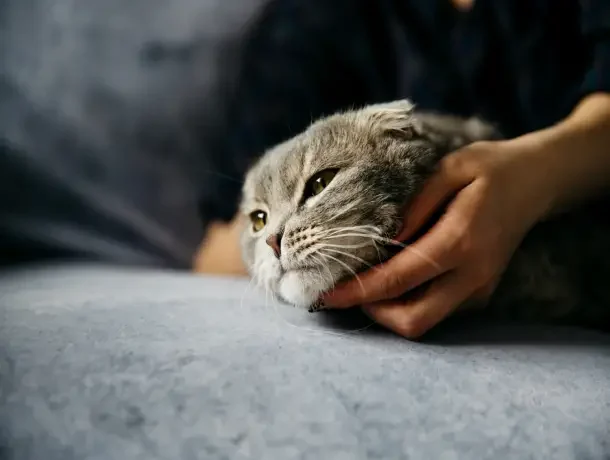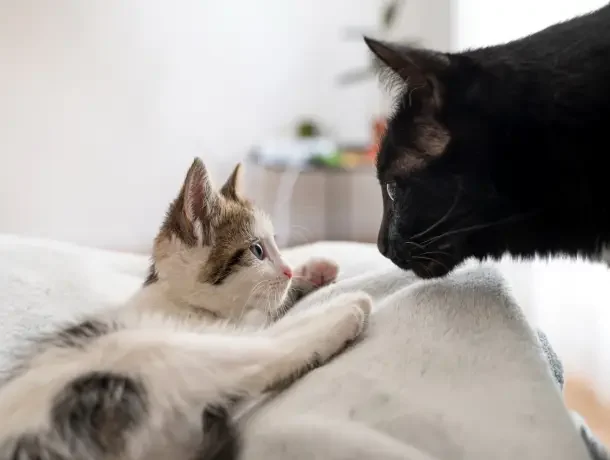For our feline friends to be healthy, happy, and generally well, properly following cat caring tips is necessary. Cats have needs that must be satisfied in order for them to survive, just like people. Nutrition, homemade food, veterinary treatment, grooming, exercise, socialisation, and keeping an eye out for any indications of health problems are all included in proper care.
Giving cats complete care not only improves their quality of life but also makes the relationship between cats and their owners stronger. It lowers stress and fosters a peaceful home environment in addition to assisting in the prevention of frequent health issues. We can make sure that our furry pets have happy lives and continue to be loved members of our family for a long time by making cat caring tips a priority.
7 Essential Cat Caring Tips
1. Proper Nutrition

Being obligate carnivores, cats have special dietary needs. They need certain nutrients, like taurine, arginine, and arachidonic acid, which are mostly present in animal-based proteins. They will get these vital nutrients in the right amounts to support their body functioning if they eat a balanced diet. Cats’ growth, maintenance, and repair of their muscles depend heavily on protein. Cats’ lean muscle mass is maintained with a balanced diet and healthy food for cats with a sufficient amount of protein, which supports their general mobility, strength, and agility.
Following cat caring tips and feeding cats with different cat food options helps them keep a healthy weight. Cat obesity can result in a number of health concerns, including diabetes, musculoskeletal difficulties, and a shortened life span. A diet customised for them promotes ideal body condition and aids in controlling calorie consumption.
A cat’s health, energy, and longevity depend critically on a balanced diet catered to their specific nutritional demands. Cat owners may support the health and well-being of their feline companions by giving them the proper nutrients in the right amounts.
2. Regular Veterinary Checkups
By scheduling routine examinations, veterinarians can identify possible health concerns early on, before they develop into more significant issues. By taking a proactive stance, illnesses are prevented from worsening and becoming more expensive by allowing for prompt intervention and treatment.
During routine visits, veterinarians perform in-depth physical examinations to evaluate a cat’s weight, dental health, coat condition, and organ function, among other areas of health. They might also carry out diagnostic procedures like blood testing or urinalysis to find hidden health issues that might not be visible from the outside.
Frequent veterinarian appointments guarantee that cats receive the immunisations needed to keep them safe from infectious illnesses. Moreover, veterinarians are authorised to prescribe and protect the cat’s health and avoid infestations, and prescribe and deliver preventative treatments for parasites including fleas, ticks, and intestinal worms.
3. Providing a Safe Environment

Curious and nimble animals, cats may face a variety of risks both inside and outside. If consumed by cats, a variety of household products, drugs, plants, and foods can be hazardous to them. Store these things high up on shelves or in cabinets so cats can’t reach them. Recognise common hazardous plants and either remove or store them out of reach from your home. Follow feline care tips to keep your cats safe and healthy.
Cats are frequently drawn to rubber bands, strings, and other small objects that they could ingest and cause choking or gastrointestinal blockages. Don’t leave these things unsecured where cats can get to them; instead, put them away in safe containers. By following these cat caring tips , you can prolong the life of your cat.
Put safety screens on balcony railings and windows to keep cats from slipping out or falling in. Provide a secure, enclosed outdoor space for supervised play, or oversee outdoor outings. Cats who chew on electrical cords run the risk of receiving burns or electric shock. To stop access, hide or conceal cords with cable organisers or cord protectors.
Cats are at risk from hot stovetops, open flames, and heavy appliances, among other domestic hazards. Keep an eye on your cats in the kitchen and make sure they don’t get into any unsafe places or objects. Make sure to cover stove knobs and confine flames carefully. It is important to follow indoor cat care instructions.
4. Grooming and Hygiene
Regular grooming and cat caring tips keep the cat’s coat lustrous, healthy, and free of matting and tangles by distributing natural oils throughout it. Frequent brushing eliminates dirt, debris, and loose hair, preventing matting and lowering the chance of infections or skin irritation. Cats lick themselves to groom, which may result in hairballs being consumed. Frequent brushing reduces the amount of hair ingested and minimises the creation of hairballs, which can lead to blockages or digestive problems. Brushing also helps eliminate loose hair from the coat.
Long-haired cats are more likely to have fur that mattes and tangles, particularly in regions like the belly, armpits, and particularly in regions like the abdomen, behind the ears, and armpits. By getting rid of dead hair and keeping hair from getting tangled, regular grooming helps avoid mats from forming.
During a cat’s grooming session, you can look for indications of skin irritation, cuts, parasites, or other medical problems. Early skin problem discovery enables timely treatment, preventing problems from worsening and becoming more serious. Hence a proper cat grooming techniques needs to be followed.
5. Exercise and Play
Cats need to be physically active for a number of reasons related to their health and well-being and hence it is an important cat caring tips you need to follow. Cats who engage in regular exercise are better able to keep their bodies in a healthy weight range. Similar to people, cats that eat more calories than they burn can develop obesity or become overweight.
Physical activity lowers the risk of obesity-related health problems like diabetes, arthritis, and heart disease by burning calories and preventing excess weight gain. Cats get cerebral stimulation from exercise, which keeps them stimulus for cats, avoiding boredom and behavioural issues while keeping them mentally occupied. Cats can benefit from mental stimulation, natural instinct satisfaction, and stress or anxiety reduction through engaging in activities such as interactive play, puzzle solving, and exploring new places. Exercise is the best pet care advice for the best practices of cat health.
6. Monitoring Behavior
There are a number of reasons why cats may exhibit common behavioural difficulties, such as stress, boredom, illness, or a lack of socialisation.Cats scratch naturally to keep their claws in place and to establish their territory. It could become an issue, though, if they scratch furniture or other unsuitable surfaces. Provide suitable scratching pads or posts in several places throughout the house. To prevent scratching, cover furniture with aluminium foil or double-sided tape, and routinely clip your cat’s nails.
Cats that exhibit aggressive behaviour may target people, other animals, or both. Identify the root cause of the hostility. There are a number of reasons why cats may exhibit common behavioural difficulties, such as stress, boredom, illness, or a lack of socialisation.
Stress, health problems, or discontent with the litter box can all cause cats to urinate or defecate outside the box. Make sure the litter box is in a quiet area, easily accessible, and clean. Make use of clumping, unscented litter, and give each cat one litter box plus an extra.
Cats who are bored or frustrated may exhibit destructive behaviours such as digging, eating, or toppling objects. Make sure there are lots of suitable play and mental stimulation areas available, such as puzzle feeders, scratching posts, and interactive toys. To keep toys engaging, rotate them frequently and offer chances for outdoor exploration in a secure, contained space and follow the cat caring tips like cat behaviour management.
7. Monitoring Health Changes
Cats need to be identified when they exhibit symptoms of illness or discomfort in order to receive timely veterinarian care and stay healthy. Notable variations in appetite, such as abrupt dietary preferences, reluctance to eat, or a drop in or increase in food consumption, may be signs of underlying health problems. Keep an eye on your cat’s eating patterns, and get advice from a vet if you see any noticeable changes. Along with cat caring tips the pet owner needs to know the best kitten care tips too, as the techniques might be different for cats and kittens.
Increasing or decreasing the amount of water you drink might be a sign of a number of health issues, such as diabetes, kidney disease, or dehydration. Pay attention to your cat’s water consumption and seek veterinary advice if you notice any abnormalities.
Urinating or faeces outside the litter box, using the litter box frequently, or straining to urinate are examples of changes in litter box behaviours that may point to kidney, gastrointestinal, or urinary tract problems. Keep an eye on your cat’s behaviour in the litter box and contact a vet if you see any changes.
Infrequent dietary errors or mild stomach upsets can sometimes result in vomiting or diarrhoea. On the other hand, recurrent or continuous diarrhoea or vomiting, particularly when coupled with additional symptoms such as fatigue, appetite loss, or dehydration, may point to more significant health problems and necessitate veterinarian care.
It’s critical to understand your asthma, infections of the respiratory system, or other respiratory diseases. Keep an eye on your cat’s respiration rate and consult a veterinarian if you observe any strange breathing patterns or respiratory problems.
Symptoms like hair loss, dryness, flakiness, redness, lumps, or pimples can all be signs of infections, allergies, or underlying health problems. Check the skin and coat of your cat on a regular basis, and seek advice from a veterinarian if you see any irregularities.
Conclusion
You must be aware that understanding your cat’s typical behaviour, routines, and looks is crucial for quickly identifying any changes or anomalies. As a pet owner, you need to follow these 7 essential cat caring tips for your cat. These 7 tips for cat owners will take care of the overall health and development of the cats. If you are concerned about the health or welfare of your cat, follow your instincts and understand the cat care essentials.
Why Choose Vetscan Diagnostics ?
Expertise You Can Trust
Our veterinary laboratory team comprises experienced veterinary professionals specializing in biochemistry, microbiology, hematology, and histopathology.
Cutting-Edge Technology
We invest in state-of-the-art diagnostic technology, ensuring precision and efficiency in our tests. With the latest advancements at our disposal, we deliver timely and reliable results.
Early Detection, Lifelong Protection
Early detection is key to preventive pet care. Our comprehensive range of tests, from biochemistry to histopathology, is designed to catch potential health issues in their early stages.
Compassionate and Seamless Experience
Beyond expertise and technology, we pride ourselves on delivering a compassionate and seamless experience.



